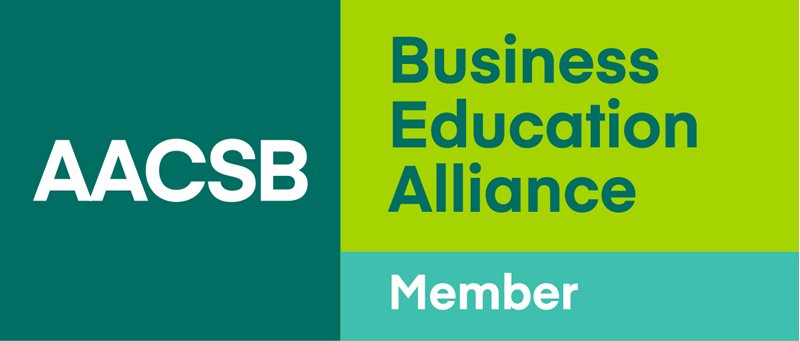Overview
There are no intakes available for this program.
The Business Fundamentals program provides students with a broad and exploratory business education. It covers business basics such as Accounting, Marketing, Human Resources, Business Mathematics, and Business Communications. This program serves as the first year for the Business Core diplomas—Business, Accounting, Human Resources, and Marketing—and graduates can choose to pursue one of these diplomas or use their Business Fundamentals certificate as a foundation for other programs of study or their career.
St. Lawrence College is a member of the AACSB Business Education Alliance. Membership in AACSB, and participation in the Business Education Alliance, does not imply Accreditation.
Program Details
Program Highlights
This program can serve as a complement to prior education to springboard a graduate to success in combination with prior education and/or experiences. On its own, the Business Fundamentals certificate allows students with an entrepreneurial mindset to acquire the background knowledge needed to successfully run their own business. This program also serves as a jumping off point to future education pathways like our diplomas, advanced diplomas, and degrees.
Program Outline
2024-2025
Through the perspective of both the Canadian and global business environments, this course will provide students with a foundational knowledge of the current state of business and an opportunity to consider what the future may hold. Learners will develop their business vocabulary, understanding of business concepts, and engage with current and relevant issues in both a Canadian and global context. Students will learn the foundations of teamwork as a component of successful business operations. The functional areas of business and their relationship to management, leadership, and the future of work are discussed.
This course is designed to help students develop and practice the communication skills needed to succeed in college and workforce environments. Emphasis is placed on improving foundational communication strategies-reading, writing, listening, and speaking—and on developing research and critical thinking skills.
This course is designed to familiarize the student with basic computer operations and applications through instructor-led exercises, activities, and case studies. It explores various concepts of effective computer usage with a hands-on introduction to the Windows operating system, file management, and working effectively and collaboratively in an online environment. It also provides in-depth exploration and application of various features of the current version of Microsoft Office software including Word, PowerPoint, and Microsoft Teams. Microsoft Excel is covered briefly in this course in relation to integration with the other Microsoft Office Suite products.
Introductory Business Math prepares students for success in business and financial mathematics. This course emphasizes the development of business-related numeracy and the fundamentals of the time value of money. Topics covered include basic numeracy, percent applications, payroll, tax, and time value of money.
In this course, students benchmark their norms and behaviours for professional and personal development. Students develop self-awareness utilizing formalized assessments to give language to the application of emotional intelligence and personal behaviours that could otherwise mistakenly be described as strengths or weaknesses. Students describe the impact of the their behaviours and further strategies to develop skills and compensate for barriers. Students practice using related terminology to better express their development progress. Students learn about high-functioning teams and practice those skills through teamwork activities. Students develop strategies for setting and implement goals.
This introductory financial accounting course provides learners with an overview of the accounting process. Using generally accepted accounting principles (GAAP), and industry standard accounting software, learners gain the foundational skills and knowledge required to complete the accounting cycle, process adjusting entries and closing processes, and prepare a rudimentary set of financial statements for service and merchandising entities. Learners discuss the fundamental elements of accounting and their impact on business operations, business ethics, and regulatory practices
The economic environment is the theater in which contemporary managers plan, organize, lead, and control. This course introduces the language and navigational skills that condition students for success in this environment. Students learn microeconomic principals including supply and demand, the themes of scarcity, productivity, efficiency and effectiveness, the concept of opportunity cost, and the relationship between these fundamentals and the Canadian economy. Employing a practical approach to the Canadian macroeconomic environment, the course examines choices by individuals, businesses and governments and their effects on Gross Domestic Product, unemployment, the money supply, and exchange rates. The course addresses factors influencing both the supply side and the demand side of the economy including productivity, consumption, savings, and investment.
In this course, the emphasis is on the development of professional communication. Students develop communication and teamwork skills through the preparation and delivery of a range of professional documents and presentations utilizing current workplace technologies.
Principles of Human Resources Management is intended to provide students with an understanding of human resources management functions within organizations. The course introduces the purpose and the application of Human Resources activities which will assist organizations in achieving their goals and objectives. As such, this course is designed to lay the groundwork for more advanced studies in Human Resources and related subjects.
Marketing Essentials introduces students to the basic principles and practices of marketing management in the modern business setting. This course examines the consumer market for goods and services and the major decision areas of marketing: identifying and selecting target markets, product, price, distribution, integrated marketing communications and customer relationship management. Key concepts including value creation, marketing mix, marketing strategy, and marketing best practices are introduced and explored. Data and the application of metrics and analytics in decision making are discussed and applied.
This course provides an overview of the mathematics of business financial management. Annuities are studied and applied to various business applications and financial decision-making such as bonds, sinking funds, investments, loans, mortgages and net present value.
This course expands on the student’s introductory level knowledge of spreadsheets and databases. Using Microsoft Excel, students learn advanced Excel features such as charts, logical functions, pivot tables, goal seek, data tables, macros, multiple worksheets, lists, look-up tables, and financial functions. The focus is on using advanced spreadsheet functions accurately and effectively to analyze problems that arise in business.
Graduates are entering the world of work just as it is being radically transformed. While technical skills remain crucial, organizations are now looking to hire a workforce with the human skills to thrive in the modern workplace. In this course, students will cultivate and apply knowledge for the contemporary workplace. Driven by case studies and real-world context, students will develop an understanding of the impacts of equity, diversity, and inclusion, social responsibility, ethics and sustainability, and client service. Students will work in diverse teams throughout this course, ultimately applying the course learning in a culminating capstone project where they will propose recommendations to an organization.
Requirements
Admission Requirements
Ontario Secondary School Diploma (OSSD) with the majority of Grade 11 and 12 courses at the C, U or M level including the following prerequisites:
- Grade 12 English at the C or U level
- Grade 11 Math at the C, U or M level
For OSSD equivalency options, see Admission Requirements.
If you are missing prerequisite courses, enroll in the Career/College Prep program - free for Ontario residents who are 19 years or older.
- Are your transcripts from outside of Canada? Please visit Applying to SLC - With Your Transcripts for more information.
Other Requirements
When computers are required during class hours, students will be working in computer labs. In order to attend virtual or alternate delivery classes, work in teams in virtual workspaces, or complete homework outside of campus and computer lab hours, students will be required to have the following technical equipment at home:
- Windows Personal Computer (laptop or PC) (Mac computers are not compatible with all software applications)
- MS Office (included with St. Lawrence College fees)
- Webcam and microphone
- High-speed internet connection
Furthermore, the following technical requirements are required for the Business Intelligence and Emerging Technologies course:
- Ram: 8 GB
- Processor: Intel Core i5 or i7 or better
- Hard drive: 500 MB
- Windows version: 10 or later
Fees
2025-2026
Fees are estimates only. Tuition is based on two semesters.
Fees are estimates only. Tuition is based on two semesters.
Cornwall
Enjoy waterfront views, modern health labs, a newly renovated library, and vibrant student spaces in our our Cornwall campus.

Other Information
Programs at St. Lawrence College are delivered using a variety of instruction modes. Courses may be offered in the classroom or lab, entirely online, or in a hybrid mode which combines classroom sessions with online learning activities. Program delivery can be run weekdays, weekends or evenings. Upon registration, each full-time student is provided a St. Lawrence College email account which is used to communicate important information about program or course events.
Advanced Standing
High school students with a minimum grade of 75% in Grade 12 M level accounting (BAT4M) are eligible to receive advanced standing in St. Lawrence College Introductory Accounting, ACCT 1. Once you have been accepted into your college program, contact your program coordinator for details.
Program Contacts
Admissions Information
Click here to message Recruitment.
